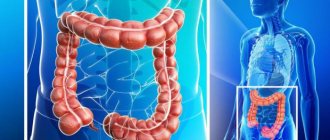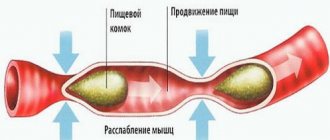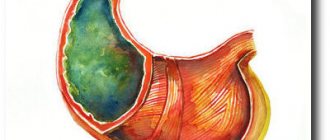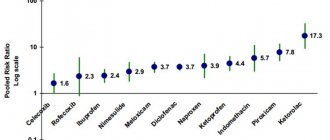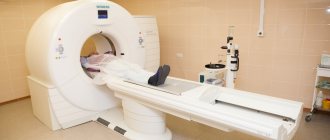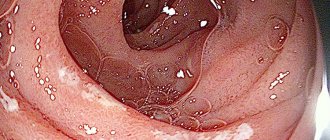Medicines for stomach pain should be taken only after the cause has been determined. The first question that needs to be answered in order to choose the right remedy for the stomach is: does it really hurt? If there is no doubt about the origin of the pain, you should find out the reasons for its occurrence.
How can you determine where your stomach is located?
Draw a conventional horizontal line through the navel. The stomach will be located above it. Approximately 2/3 of its parts are located in the left hypochondrium, the remaining part is in the epigastric region (under the costal arch of the chest). Therefore, stomach pain is most often felt in the area of the 4th intercostal space on the left.
Figure 1 - When your stomach hurts, you need to find out whether the stomach is to blame
Main causes of stomach pain
The need to take syrups or tablets for stomach pain most often results from:
- unhealthy diet - regularly skipping meals, eating dry food, overeating, fasting, alcohol abuse, eating sour, spicy food on an empty stomach;
- poisoning with low-quality products, inedible substances;
- cholecystitis - inflammation of the gallbladder, stones in it;
- pancreatitis - inflammation of the pancreas;
- gastritis, diverticulitis - inflammatory diseases of the gastric mucosa;
- stomach ulcer, duodenal ulcer;
- gastroesophageal reflux - the valve that separates the esophagus from the stomach does not work correctly, resulting in digested food being thrown into the esophagus;
- parasites – cause intoxication of the body, which is manifested by vomiting, nausea, bloating, etc.;
- intolerance to gluten, lactose, and other substances;
- prolonged stress.
Figure 2 - About 10% of stomach pain is caused by an ulcer
How does it hurt?
The pain can be aching, sharp, dull, bursting, squeezing, cutting, stabbing, pulling.
| Nature of pain | Possible diseases |
| Sudden acute | Cholecystitis, pancreatitis, duodenal ulcer |
| Sudden sharp | Poisoning, chemical burn of mucous membrane, perforation of ulcer |
| Dull aching | Chronic gastritis, initial stage of ulcer. With gastritis, pain appears on an empty stomach and immediately after eating |
| Dull aching, turning into a burning sensation | Acute gastritis, ulcer |
| Spasms, contractions (most often at night or after eating) | Inflammation of the duodenum, ulcer |
| Mild aching pain that does not disappear for a long time | Polyp, malignant formation |
| Severe pain, contractions | Gastrointestinal infections |
| Severe pain in the upper abdomen that lessens over time but does not go away completely | Diseases of the large intestine (eg, colitis) |
| Severe pain in the navel area that moves to the right and up | Appendicitis |
A short-term “shooting” pain that is felt after a sudden movement or when inhaling indicates a spasm of the diaphragm. In this case, the stomach may not be to blame - such sensations are characteristic of circulatory disorders and inflammatory processes. Therefore, medications for stomach pain are likely to be ineffective.
Figure 3 - The nature of pain is important for diagnosis
To accurately make a diagnosis and prescribe effective treatment, a description of the pain is not enough. You need to undergo a series of tests, for example, for the presence of Helicobacter pylori (the bacterium that causes stomach ulcers), as well as ultrasound, FGDS. That is why you should ask not a pharmacist, but a gastroenterologist, what to drink for stomach pain.
Under no circumstances should you endure stomach pain or suppress it with medications without a doctor’s prescription. Painful sensations are a signal that something is already going wrong in the body, and urgent professional intervention in its functioning is necessary.
Symptoms and causes of intestinal disease
The intestine belongs to the digestive system and performs a number of significant functions:
- breaks down products;
- helps absorb nutrients into the blood;
- increases immune system protection;
- removes waste and toxins.
With intestinal disease, the work cycle of certain functions is disrupted, so a specialist can very accurately indicate the nature of the pathology. The most common signs of the disease include:
- stomach ache. The functioning of the intestines at the proper level does not cause any discomfort;
- Pain in the navel area indicates a disease of the small intestine. The pain is most often aching or pulling;
- constipation. If the symptom is not accompanied by other discomfort, the cause of the phenomenon can be considered anything, for example, taking medications, stress, poor diet;
- diarrhea. May be caused by an inflammatory process associated with the intestines or stomach.
Changes may occur in other systems and organs. A decrease in the level of absorption of important nutrients has a negative impact on well-being and skin condition. Weight gain and menstrual irregularities may also occur.
Treating symptoms without eliminating the causes of discomfort will be ineffective. Diseases that disrupt intestinal function include:
- Crohn's disease;
- enteritis;
- colitis;
- dysbiosis.
The disease can occur in acute or chronic form; the severity and severity of pain will depend on the severity of the disease.
Medicines for stomach pain that you can take while waiting for the doctor
It happens that the pain in the stomach becomes unbearable, and you still have to take some kind of pill. This should be done as a last resort, since taking the drug can distort the picture of the disease and give grounds for an incorrect diagnosis. In general, doctors allow you to take:
- analgesic - medications that temporarily relieve pain, for example, analgin. At the same time, the situation in the stomach does not change, and there is no need to delay visiting a doctor;
- antispasmodic - drugs that stimulate the smooth muscles of internal organs: Papaverine, No-Shpa, Duspatalin, Trimedat. As a result, the passage of food and gases is facilitated, and muscle spasms disappear.
If you have stomach pain, it is better not to take pills immediately before seeing a doctor. To help quickly make the correct diagnosis and prescribe treatment, prepare the following information:
Figure 4 - Suspensions and tablets for stomach pain should not be used before examination by a doctor
- the circumstances of the pain (before, during, after eating, what you ate, drank, or how long you didn’t eat or drink, whether there were abdominal injuries, blows, stress);
- other symptoms: nausea, bloating, foul-smelling gas, rash, vomiting, heartburn, dizziness, diarrhea/constipation, change in the consistency and color of stool, blood, mucus in the stool;
- did you take medications for stomach pain before applying, what are you currently taking for other diseases;
- What changes have you had in your health status recently?
Try to move less, do not eat and, if possible, do not drink. You cannot give enemas or take laxatives.
Note! Never use a hot heating pad or other heat. Sometimes this does help reduce pain, but it increases inflammation, bleeding and pus formation. Such self-medication can be life-threatening.
Figure 5 - If you have stomach pain, you should not use a heating pad
In what dosage forms are stomach medications available?
Medicines for the stomach are available in the form of tablets, syrups, suspensions and powders, which should be dissolved in juice or water. Some drugs are available in different dosage forms. It depends on their purpose and characteristics of the action. For example, enveloping and adsorbing drugs (Almagel, Maalox, Phosphalugel, Gaviscon) are produced in the form of a suspension, and children's drugs are in the form of syrup.
Medicines for stomach pain in tablets:
- analgesics;
- antacids;
- proton pump blockers;
- astringents;
- gastroprotectors;
- combination drugs;
- antispasmodics.
Medicines for the intestines
Intestinal infections negatively affect not only the functioning of the gastrointestinal tract, but also the condition of the entire body. Abdominal pain, bloating, constipation, diarrhea, lack of appetite and general weakness are still an incomplete list of symptoms accompanying intestinal diseases. How to choose an effective medicine for the intestines?
Medicines for the treatment of inflammatory bowel disease
Treatment of inflammatory processes in the intestines is aimed at stopping the inflammatory process and maintaining immunity. An effective drug is Sulfasalazine, which accumulates in the intestinal walls, preventing the spread of infection.
The drug also has an antimicrobial effect. The drug slows down the absorption of vitamin B9 in the intestines, so patients are recommended to take it additionally during the treatment period. Analogues of Sulfasalazine are Salapiradazine and Salofalk.
For severe intestinal diseases, Prednisolone, which has anti-inflammatory properties, as well as Azathioprine and Cyclosporine (non-hormonal immunosuppressants) are often used. These drugs often cause serious side effects, so they are prescribed in short courses if nothing else works.
Astringent drugs that envelop the mucous membrane (for example, Tanalbin) also help reduce the inflammatory process in the intestines.
Irritable bowel syndrome
Irritable bowel syndrome is an unpleasant disease that manifests itself as abdominal pain, constipation or upset. The following drugs are used to treat pathology:
- Alverine and Mebevirine relieve pain and spasms.
- Bisacodyl is an effective laxative, prescribed for constipation. It works almost immediately.
- Duphalac, Portalac, Forlax are safe laxatives.
- Herbal medicines (sena, rhubarb, buckthorn) also have a laxative effect, but about 10 hours after use.
- Loperamide is a bowel medicine for diarrhea.
- Espumisan helps to cope with excessive gas formation.
Drugs for the treatment of intestinal dysbiosis
What medicine should be used to improve bowel function? All medications used in the treatment of intestinal dysfunctions can be divided into two groups:
1. Probiotics are preparations containing a large number of microorganisms that prevent the proliferation of harmful bacteria in the intestines. They can be divided into several types:
- Preparations based on lactobacilli are available in the form of tablets (this is Lactobacterin), as well as in powder form (Acilact and Biobakton). In addition, such medicines began to be produced in the form of rectal suppositories - Acylact. The drugs can be taken in parallel with antibacterial agents for the prevention and treatment of dysbiosis.
- Products containing bifidobacteria are available in the form of tablets, suppositories and powders (Bifidumbacterin, Probifor).
- Probiotics, which include lactobacilli in combination with bifidobacteria. A popular product in this group is Florin Forte and Linex. The drugs are available in powder form.
- Combined probiotics contain several types of bacteria beneficial for intestinal function (Bifiform and Bifikol) and are available in capsule form.
2. Prebiotics are medications that help restore microflora in the intestines. Almost all drugs in this group are based on lactulose (a special organic acid). This substance suppresses the development of pathogenic microflora in the intestines and also reduces blood pressure. An example of such drugs:
- Portalak,
- Normaze,
- Duphalac.
The use of the above prebiotics is contraindicated in patients with galactose and fructose intolerance.
The best remedies against dysbiosis
There are a large number of drugs to normalize intestinal function, as well as to prevent the development of dysbiosis. We offer you a list of medications for the intestines that doctors most often prescribe:
- Atromax can be used in parallel with antibiotics.
- Acylact - tablets or suppositories, is prescribed to both adult patients and newborns.
- Biobakton can be taken in parallel with antibacterial drugs.
- BifidumBakterin is a medicine for the intestines in the form of tablets that does not cause allergies.
- Lactobacterin is available in powder and tablet form and has virtually no contraindications.
- Linex is available in the form of tablets and powder and is prescribed to adults and children.
- Portalac has virtually no contraindications.
- Profibor is prescribed to adults and children over 2 years of age.
- Festal has antibacterial and anti-inflammatory effects.
- Hilak Forte is prescribed to women during pregnancy and breastfeeding.
A doctor should prescribe medicine to treat the intestines; do not self-medicate.
← Previous article Medications for colon cleansing
Next article → Medicines for thrush
What to drink for your stomach?
What exactly to drink for stomach pain depends on the diagnosis:
- for gastritis: Smecta, Almagel - to restore the gastric mucosa and against diarrhea, to relieve inflammation - Iberogast, to eliminate spasms - No-Shpa, Cerucal, to correct the enzyme composition of the medium - Mezim, Digestal;
- for cholecystitis, gallstones: Allochol, Gepabene;
- in case of poisoning: sorbents Enterosgel, Lactofiltrum, Activated or White carbon, Smecta. Analgesics will also help get rid of stomach pain in the initial stages of the disease: Analgin, Baralgin.
- for high acidity: antacids Gaviscon, Rennie, Maalox;
- for ulcers: wound healing - Methyluracil, Actovegin, to suppress Helicobacter pylori - Ampicillin, Pilobact-Neo, proton pump blockers Omez, Omeprazole, Nexium, other drugs for complex treatment, selected individually based on test results.
A number of medications for heartburn and stomach pain are useful in a variety of situations. For example, Smecta can be taken for stomach pain caused by eating disorders, heartburn, bloating, acute or chronic diarrhea, gastritis, stomach and duodenal ulcers, colitis.
Many medicines have analogues. For example, to relieve spasms of the smooth muscles of internal organs, you can buy No-Shpu or Drotaverine. The main active ingredient of these drugs is the same – drotaverine. However, if you pay about $1 for 30 tablets of Drotaverine, then for the same number of yellow tablets called No-Shpa - about $2.
The best laxatives
When moving on to the category of over-the-counter laxatives, you need to remember that they should be used only if you have not had a bowel movement for more than 3 days. You should not wait a longer period of time. But, in addition to taking laxatives, it is necessary to use non-medicinal methods to combat atonic constipation. This includes abdominal massage, physical activity, exercise, the use of dried fruits, fiber, dishes made from boiled beets and raw vegetables, and adding vegetable oils to the diet. All these measures will help eliminate atonic constipation in most uncomplicated cases.
Unfortunately, quite often the cause of chronic constipation is hemorrhoids, in which bowel movements are artificially delayed due to fear of pain and bleeding. In this case, you should not use laxatives uncontrollably, but try to get treatment from a proctologist and eliminate inflamed and bleeding hemorrhoids: either with the help of conservative therapy in the initial stages, or with the help of simple minimally invasive interventions, which are currently classified as outpatient surgery.
Duphalac (Goodluck, Normaze, Lactusan)
Rating: 4.9
Duphalac is a modern laxative. It consists of lactulose and is a syrup that has a straw-yellow color. The task of lactulose is to cause osmotic diarrhea, stimulate intestinal movements, and also have a detoxification effect by removing nitrogen compounds found in the intestines. That is why lactulose is prescribed to patients with chronic liver failure, in which the amount of nitrogen compounds in the blood increases.
Lactulose helps eliminate atonic constipation, and what is especially important is that after taking it, the normal physiological rhythm of bowel movements is restored. Lactulose is also prescribed for intestinal dysbiosis, and is especially effective when it is prescribed together with enterosorbents.
Lactulose should be used to treat habitual constipation in adults according to a special regimen. So, the daily dose is taken immediately in the morning, during meals. For adults, it ranges from 15 to 50 ml on the first day, and from 10 to 30 ml in subsequent days as a maintenance dose. The transition to the maintenance dose occurs after 2 days, and it is after 2 days that the laxative effect will develop. Duphalac does not work immediately. Lactulose is produced by the Abbott laboratory, and a 500 ml syrup will cost about 540 rubles.
Advantages and disadvantages
A very big advantage of lactulose is the ability to alleviate the condition in patients with hepatic encephalopathy, since it removes residual nitrogen from the intestines. It is also worth noting the mild clinical effect of Duphalac, rare intolerance, as well as the ability to take the drug for a long time, more than 6 months. However, in the first days after the appointment of Duphalac, flatulence may develop, and the opposite effect may occur: loose stools and abdominal pain will appear. This is most often associated with a high initial dose, and after lowering the dose, stool returns to normal and side effects disappear. It is also important that Duphalac is successfully used during breastfeeding, as well as in pregnant women. Contraindications include acute intestinal obstruction, hypersensitivity and lactose intolerance. With special precautions, Duphalac can be used in patients with diabetes.
Mukofalk
Rating: 4.8
Mucofalk is another mildly acting drug for chronic and atonic constipation, which entirely contains plant components: namely, the shell of psyllium seeds. Why such an unusual choice of active ingredient? It is due to the fact that the seed shell is able to absorb water so well that as a result it becomes 40 times heavier than its own dry weight. Accordingly, the volume of these dried shells increases many times. As a result of a significant increase in the active substance in volume, the intestinal wall is irritated, massaged from the inside, and its contents become less viscous and more plastic.
While using Mucofalk, you need to drink as much water as possible: as a result of the movement of a large elastic mass down the intestines, the defecation reflex is stimulated, and physiological bowel movement occurs. In some cases, Mucofalk takes effect only after two to three days, but sometimes even after 12 hours. Among the indications for use, in addition to constipation, Mucofalk includes hemorrhoids, irritable bowel syndrome, as well as the postoperative period in proctology, when it is necessary to completely eliminate the risk of constipation. Mukofalk is produced by the German company Doctor Falk, and the cost of one package of granulated plantain weighing 5 g No. 20 costs 530 rubles. This is not a cheap pleasure.
Advantages and disadvantages
Do not think that treatment with swelling plantain seeds is completely harmless. There are a significant number of contraindications, ranging from individual intolerance to intestinal bleeding, intestinal diverticulosis, postoperative scars that impair patency, paresis, paralytic ileus or intestinal obstruction. Therefore, ideally, a doctor should prescribe Mucofalk. On the other hand, the drug is well tolerated in patients who do not have risk factors, causes virtually no side effects and promotes the physiological establishment of a bowel movement rhythm.
Senade
Rating: 4.7
Senade is a budget option for treating chronic constipation and is popularly known as senna extract. Most often it is used in the elderly, and also as a drug for the treatment of intestinal atony after a long stay in an immobilized state, that is, in bedridden patients. This usually happens after injuries, plaster casts, pneumonia. Senade is used with a minimum dose, one tablet in the evening. It is possible that in the morning the effect will be quite strong, even leading to diarrhea, so taking several tablets at once is prohibited. If for three days daily taking 1 - 2 tablets of Senade does not cause a laxative effect, then you cannot independently exceed the indicated dosage and you should consult a doctor. Senade is produced by the Ukrainian company Health, and one package of tablets, designed for 10 days of use, with an average therapeutic dosage of two tablets daily costs only 23 rubles.
Advantages and disadvantages
The indisputable advantage of Senade has always been and will be its low cost, so this drug is in every medicine cabinet of a low-income elderly person. Also, one cannot discount the fairly high efficiency. The drug has a laxative effect quickly enough, and at the same time the person does not experience virtually any discomfort at night. However, senna extract is contraindicated for spastic constipation, and only a specialist can figure out which form of constipation is atonic or spastic. The drug should not be prescribed for acute inflammatory processes in the intestines, such as ulcerative colitis and Crohn's disease, during exacerbation of gastric and duodenal ulcers, and it should not be used during pregnancy.
Which is better - Gaviscon or Almagel?
The effect of both of these gels for stomach pain is that they form a dense barrier (film) that envelops the gastric contents and is not absorbed during digestion. This protects the inflamed stomach walls from the effects of acid. At the same time, the composition of the gastric juice itself does not change, and food digestion occurs in full. The gel-like film also protects the esophagus if stomach contents are thrown into it, preventing heartburn and inflammation. To get rid of stomach pain, these gels or suspensions should be taken after meals without drinking water. The dose of the drug lasts approximately 4 hours. The cost of both drugs, depending on the offers of pharmacy chains, differs by literally $0.3–0.5.
Figure 6 - A number of drugs for stomach pain have a similar effect
You should make a choice based on your health status, side effects and the composition of the drugs. For example, Gaviscon is allowed for pregnant women to take, but Almagel is not recommended because the necessary studies have not been conducted on it. Therefore, the right to make the final decision on prescribing the drug is transferred to the doctor, who will weigh the benefits for the mother and the likelihood of harm to the fetus.
How to help the gastrointestinal mucosa
Increased secretion of hydrochloric acid, the destructive effects of pathogenic microorganisms irritate the walls of the stomach, and the protective film becomes thinner. Prolonged exposure to negative factors leads to damage to deeper layers, tissue breakthrough, bleeding and perforation of ulcers.
Medicinal substances that protect the mucous membrane of internal organs can prevent such dangerous consequences:
- Cymed is prescribed in case of deficiency of microelements (in particular iron and zinc) necessary for the regeneration of damaged tissues. The drug has a hematopoietic, analgesic, and immunostimulating effect;
- Venter is a gastroprotective agent that envelops the walls of organs, allowing them to recover;
- Regesol has a wound-healing effect and promotes the healing of ulcerative and erosive lesions. The natural ingredients included in the drug (licorice root, mint leaves, sea buckthorn, calendula flowers) have a multivitamin effect;
- Gastro-norm - a bismuth-containing drug reduces the acidity level of the gastric environment, restores the mucous membrane in case of Helicobacter pylori infection, gastroesophageal reflux and peptic ulcer diseases.
Prokinetics
Peristalsis disorders are usually associated with poor diet, prolonged stress, and insufficient physical activity. In the treatment of constipation, drugs that restore the motor activity of the gastrointestinal tract help.
Prokinetics can also be prescribed in the complex treatment of ulcers or gastritis.
The most effective medications are:
- Lactiol (Exportal) is a safe laxative that softens stool, increasing its volume and facilitating movement through the digestive system;
- Linaclotide is effective for chronic constipation. The drug is also prescribed in case of irritable bowel syndrome;
- Mucofalk is of plant origin, so it is prescribed even during pregnancy. Doctors recommend this medicine for children too. Plantain seeds, which are part of the drug, stimulate the intestines, cleansing it;
- Castor oil stimulates mucosal receptors and enhances intestinal motility;
- Almond oil and glycerin are considered mild laxatives;
- Resolor affects colon motility, helping to have bowel movements more regularly;
- Prelax is suitable for adults and children, provides first aid for stool retention. Helps restore beneficial microflora;
- Itomed will help with pain in the stomach and intestines. In addition to improving the motor function of internal organs, the medicine relieves heartburn and discomfort in the abdomen;
- Motilium is the most popular remedy for enhancing gastrointestinal motility. Having few contraindications, the drug fights symptoms such as heaviness, bloating, nausea;
- Loperamide and Diamidine, on the contrary, slow down the movement of feces through the digestive organs, making them more viscous and dense. These medications are indicated for increased peristalsis.
Antispasmodics
Drugs in this group relieve muscle spasms. They are usually prescribed for severe pain syndrome, for functional dyspepsia, for the treatment of patients with affected intestinal syndrome, in case of exacerbation of peptic ulcer disease.
Self-administration of painkillers before diagnosis is not recommended, as it may make it difficult to determine the cause of the discomfort.
In gastroenterology, the following antispasmodic drugs are used:
- No-shpa,
- Odeston,
- Drotaverine,
- Papaverine,
- Plantex (for babies and older children),
- Iberogast, which is a herbal remedy.
Enzymes
The restoration of impaired digestive function is facilitated by drugs that include digestive enzymes. Enzyme preparations include: Mezim, Festal, Penzital.
Enterosorbents
When the body is affected by pathogenic bacteria, agents are used that remove harmful microbial waste products, as well as various toxic substances. These are well-known to everyone: activated carbon, Smecta, Enterosgel.
Carminative drugs
Gases formed during the digestion process can cause acute pain, especially in children. Espumisan and Plantex, which contains fennel, help reduce flatulence and the release of gases from the intestines, which makes it possible to treat intestinal diseases in children, starting from a young age.
Antiemetics
Constant vomiting, like diarrhea, leads to dehydration of the body, damage to the esophageal mucosa by stomach contents, and weakens a person. The following medications are prescribed to reduce the gag reflex: Tropindole, Promethazine, Metoclopramide, Ondansetron.
It is not recommended to take antiemetic tablets in case of poisoning!
Antidepressants, sedatives
Many diseases of the gastrointestinal tract are directly related to the psychological state of the patient: any stress, chronic depression, negative emotions negatively affect the condition of the internal organs. Sedatives are prescribed by a psychologist or psychotherapist.
The following have mild sedative properties: validol, valocordin, motherwort tincture, preparations containing valerian (Persen, Novo-passit).
Antidepressants are used in the fight against depression; they improve patients' mood and general mental state: Amitriptyline, Imipramine.
Any medications, including herbal ones, as well as folk remedies, should be taken only in consultation with the attending physician. Self-medication is dangerous because it can provoke allergic reactions, complications, and the transition of the disease to the chronic stage.
If you are not a specialist in the field of medicine, you should not rely on unreliable information: visiting a doctor will save you from many unpleasant consequences! Be healthy!
What tablets for stomach pain can be used during pregnancy?
Pregnancy significantly narrows the list of medications for stomach pain that a doctor can prescribe to a patient. Most often, pregnant women experience heartburn, which has physiological causes. Since the stomach is a hollow organ, the growing uterus compresses it the most. This is especially noticeable in the third trimester. Such heartburn is treated symptomatically - you can take Smecta, Rennie, and other antacid drugs.
Figure 7 - Many medications for stomach pain are contraindicated during pregnancy
In more complex cases, when a pregnant woman is diagnosed with gastritis, ulcers, cholecystitis or pancreatitis, treatment regimens are drawn up by doctors. In this case, the risk to the fetus is compared with the benefit to the mother. If the disease can be “preserved,” maintenance medications are prescribed, and the main treatment is transferred to the postpartum period. In any case, there is no need to panic: new remedies for stomach pain with wide areas of application are constantly being developed.



